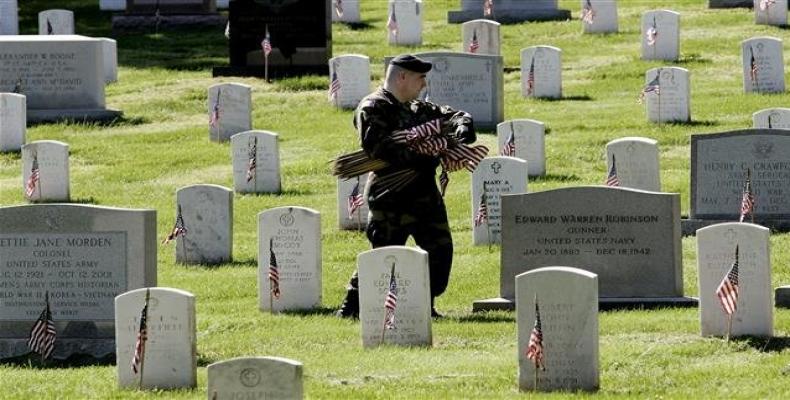Washington, October 24 (RHC)-- Suicide rates have jumped substantially among young U.S. military veterans, despite efforts by the Pentagon to curb the problem, according to new data from the US government.
Military veterans aged 18 to 34 have higher rates of suicide than any other age group, the US Department of Veterans Affairs (VA) said in its National Suicide Data Report. In total, 6,079 veterans killed themselves in 2016, down from 6,281 in 2015, the report said.
The suicide rate for young veterans increased to 45 deaths per 100,000 population in 2016, up from 40.4 in 2015, even as the overall veteran suicide rate decreased slightly. Many veterans in that age group fought in the U.S. wars against Iraq and Afghanistan.
“This isn’t just alarming. It’s a national emergency that requires immediate action. We’ve spent the last decade trying to improve the transitioning process for our veterans, but we’re clearly failing, and people are dying,” said Joe Chenelly, the executive director of the national veterans group Amvets.
More than 6,000 veterans have killed themselves each year since 2008, according to the VA data. Veteran suicide rates increased 26 percent between 2005 and 2016, as suicide rates in the overall U.S. population also increased.
The suicide rate was 1.5 times greater for veterans than for civilians who never served in the military, even after adjusting for age and gender. The gap was even greater for female veterans: after adjusting for age, their suicide rate was 1.8 times greater than the rate for non-veteran women in 2016.
“The U.S. Department of Veterans Affairs (VA) is committed to veteran suicide prevention,” the VA says in its report. “To prevent veteran suicide, we must help reduce veterans’ risk for suicide before they reach a crisis point and support those veterans who are in crisis. This requires the expansion of treatment and prevention services and a continued focus on innovative crisis intervention services.”
“The new data tells us that too many younger veterans – specifically those of the post-9/11 era – were slipping through the cracks despite all the efforts to address mental healthcare access and barriers to seamless transition after service,” Chenelly said.
Veterans were also more likely to kill themselves using a gun. In 2016, 70 percent of veteran suicides were by firearm, compared with 48 percent of non-veterans.
Report says suicide rate rises among young U.S. veterans

Related Articles
Commentaries
MAKE A COMMENT
All fields requiredMore Views
- Cuba Salud 2025 will ratify the Cuban Revolution's achievements in health care
- Children from the capital dominated taekwondo in the Pioneer Cups
- President Díaz-Canel inaugurates Cuba Salud 2025: A convention for universal well-being
- U.S. revokes visa of Colombian President Gustavo Petro
- Official mourning in Cuba for the death of Pope Francis

